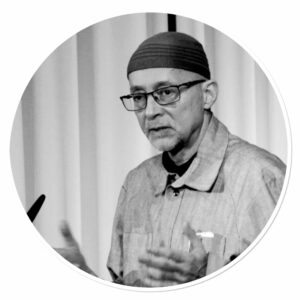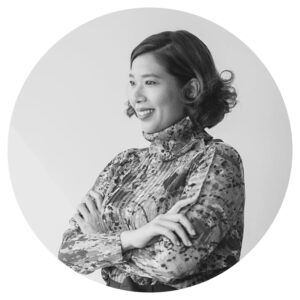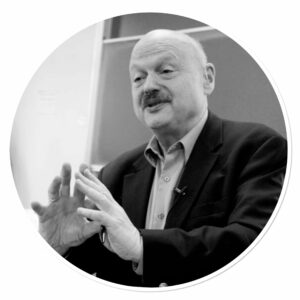Michael Herzfeld
“Spatial Cleansing: Erasing and Constructing Future Pasts.”
July 26, 2024 Keynotes
Michael Herzfeld, a distinguished scholar at Harvard University, has made significant contributions in the field of anthropology, particularly focusing on urban areas and Thailand. He is the Ernest E. Monrad Research Professor of the Social Sciences Emeritus at Harvard, with research interests spanning social theory, the history of anthropology, social poetics, and the politics of history. His work notably encompasses studies in Europe, especially Greece and Italy, as well as in Thailand.
Herzfeld’s work in Thailand is particularly notable for its focus on urban anthropology. He has critically examined themes such as gentrification and the impact of historical conservation in justifying urban redevelopment, drawing on fieldwork from Thailand, among other locations. His insightful approach is evident in works like “Siege of the Spirits: Community and Polity in Bangkok,” where he offers an engaged and detailed analysis of developmentalist and civilizational discourse in Thailand. This work is recognized for its thorough exploration of the struggles faced by small, impoverished communities in Bangkok, marking it as a significant contribution to urban ethnography.
Additionally, Herzfeld has written about the consequences of urban beautification in Bangkok, discussing the class-based pursuit of urban purity in the city. His analysis in “The Blight of Beautification: Bangkok and the Pursuit of Class-Based Urban Purity” delves into the complexities of urban development and the social implications of such initiatives. This work contributes to a broader understanding of the socio-political dynamics in urban Thai settings.
Through his extensive research and publications, Michael Herzfeld has provided valuable insights into the interplay between urban development, historical conservation, and social dynamics in Thailand, thereby enriching the field of urban anthropology.
His selected publications include:
2016. Siege of the Spirits: Community and Polity in Bangkok. Chicago: University of Chicago Press.2009. Evicted from Eternity: The Restructuring of Modern Rome. Chicago: University of Chicago Press.2004. The Body Impolitic: Artisans and Artifice in the Global Hierarchy of Value. Chicago: University of Chicago Press.2002. “The Absence Presence: Discourses of Crypto-Colonialism”. The South Atlantic Quarterly 101(4): 899-926.1997. Cultural Intimacy: Social Poetics in the Nation-State. New York: Routledge.

AbdouMaliq Simone
“How Black Life Matters for How We Understand Urban Life”
July 27, 2024 Keynote
AbdouMaliq Simone is a distinguished academic and Senior Professorial Fellow at the Urban Institute, University of Sheffield. His extensive work focuses on urban studies, particularly in the context of the Global South. Simone’s research delves into the spatial composition of extended urban regions and the production of everyday life for urban majorities in these areas. He explores various facets of urban life, including infrastructural imaginaries, collective affect, global blackness, and the histories of the present for Muslim working classes.
In addition to his role at the University of Sheffield, Simone is also a Visiting Professor of Urban Studies at the African Centre for Cities, University of Cape Town, and co-director of the Beyond Inhabitation Lab at the Polytechnic University of Turin. His work prompts a reevaluation of urban studies by centering on “Southern Urbanisms,” which sheds light on the everyday ways of living for residents in cities of the Global South. This approach offers a nuanced understanding of urbanism in these regions, emphasizing the unique challenges and realities faced by these communities.
Simone’s contributions to urban studies, particularly in the Global South, provide valuable insights into the complex dynamics of urban life in these rapidly changing and diverse environments. His work underscores the importance of considering local contexts and experiences in the study and planning of urban areas.
His publications include :
2022. The Surrounds: Urban Life Within and Beyond Capture. Durham, NC: Duke University Press.
2018. Improvised Lives: Rhythms of Endurance in an Urban South. Cambridge UK; New York: Polity.
2017. New Urban Worlds: Inhabiting Dissonant Times, with Edgar Pieterse. Cambridge UK; Malden, MA: Polity.
2014. Jakarta: Drawing the City Near. Minneapolis; London: University of Minnesota Press.
2009. City Life from Jakarta to Dakar: Movements at the Crossroads. New York; London: Routledge.
2005. Urban Africa: Changing Contours of Survival in the City. Dakar: Council for the Development of Social Science Research in Africa; London: Zed Books. With Abdelghani Abouhani.
2004. For the City Yet to Come: Urban Life in Four African Cities. Durham, N.C.; London: Duke University Press.
1994. In Whose Image? Urban Practices and Political Islam in Sudan. Chicago; London: University of Chicago Press.

Niramon Serisakul
“Spatial Methods for Cities in an Uncertain Future”
July 28, 2024 Keynote
Niramon Serisakul is a notable figure in the field of urban design and planning, holding the position of Associate Professor and Director of the Urban Design and Development Center (UDDC) at the Faculty of Architecture, Chulalongkorn University. Her significant contributions in this area have been recognized with the prestigious Chevalier dans l’Ordre des Palmes académiques (Knight of the Order of Academic Palms) distinction, awarded by the Government of France.
One of her key projects, in collaboration with the Bangkok Metropolitan Administration, is the “GoodWalk” initiative. This project exemplifies her focus on creating ‘designable cities’, with a particular emphasis on ageing-friendly urban design. This approach is aimed at enhancing the usability and accessibility of buildings and public spaces for all age groups, showcasing a commitment to inclusive and sustainable urban development.
Serisakul has also been vocal about the challenges faced by Bangkok in terms of green space availability. She highlights the city’s lack of sufficient green areas relative to its population size and the unequal access to public parks. This observation underscores the critical need for urban planning that prioritizes environmental sustainability and equitable access to natural spaces for urban dwellers. Additionally, her work on “Water Management in Bangkok and Uneven Vulnerabilities” sheds light on the complex interplay between urban development and environmental challenges. This research is pivotal in understanding how urban planning and design can mitigate the risks and impacts associated with water management in densely populated areas, particularly in a context marked by rapid urbanization and climatic changes.
Serisakul’s expertise and projects in Bangkok reflect a deep understanding of the nuances of urban design, especially in addressing the unique challenges faced by rapidly growing cities in the Global South. Her work stands as a testament to the importance of integrating sustainability, inclusivity, and resilience in urban planning and development strategies.
Her publications include :
2023. Serisakul, N. and Guntamueanglee A. Walkable City: Muea Krung Thep Ok Doen, Bangkok. Li-Zenn.
2019. Serisakul, N. and Guntamueanglee A. How to Make Walkable Bangkok. Thai Health Promotion Foundation. Bangkok Thailand.
The Urban Growth Management Policy in Thailand in the Urban Growth Management Policy in the World (to be translated in Japanese).2018. Kulsrisombat, N., Vichientpradit P. and Guntamueanglee A. (2018) Walking Project Study of the potential for access to public aminities by promoting walkability and indicators of walkability potential. Unisearch Journal Volume 5 Number 1(January-April 2018) Chulalongkorn University.
2017. Kulsrisombat, N., Guntamueanglee, A., Vichienpradit, P. and Punnoi, N. (2017). Walking Accessibility to Urban Facilities in Chiang Mai, Thailand. in journal of RESGAT. Vol.18 Special Issue. 207-218 pp.
2008. Kulsrisombat, N., Kidokoro, T., Harata, N., Subanu, L.P., Jessen, J., Motte, A., Seltzer, E.P (eds), De Facto Urban Regeneration: A Case Study of Chiang Mai City, Thailand, in Sustainable City Regions: Space, Place and Governance for Sustainable Urban Regeneration, Springer Japan.







